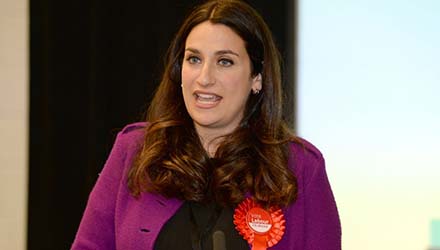There are signs that Corbyn and his allies are finally starting to fight back, reports Carla Roberts
Amazingly, there are still people ostensibly on the Labour left appealing for ‘party unity’. But the last few weeks will have done wonders to convince most Jeremy Corbyn supporters that, in fact, there can be no unity with the right in the party. Corbyn and his allies have certainly launched plenty of appeals for ‘unity’ in the past three and a half years – trying to appease the right by bending over backwards to accept most of their demands. But we are seeing signs that, perhaps, the policy of appeasement pursued by Corbyn’s office might finally be coming to an end.
Crucial to this was the news that the national executive committee has commissioned general secretary Jennie Formby to urgently produce an outline of how and when the newly reformed trigger ballots can be applied in local Constituency Labour Parties to allow for a democratic contest between different parliamentary candidates even if a snap election is called – apparently, this is to be produced this month, well before the next meeting of the NEC. This announcement seems to have massively upped the tempo and the temperature of the civil war within the party. Many career members of the PLP had probably hoped that the rule change agreed at the September 2018 conference in Liverpool would be quietly buried – or its implementation postponed and then overtaken by yet another snap election. And, judging by Corbyn’s ‘softly softly’ approach to the right since his election in 2015, that would not have been so surprising.
The fact that local party members will now get a realistic chance to get shot of their unpopular MPs will have put the fear of god into many of them – and they are hitting back with everything they have. Tom Watson’s demand (backed up by Tony Blair) that Wavertree CLP should be suspended simply for organising a discussion of two no-confidence motions against its MP, Luciana Berger, should be seen in this context. It is to be welcomed that Jennie Formby has let it be known publicly that the CLP has no case to answer. Yes, we have seen Corbyn and John McDonnell apparently leaning on the movers to withdraw their motions – but at the same time they have also rather loudly let it be known that Berger should indeed be challenged for refusing to rule out the possibility of leaving Labour to join a new centrist formation. Local comrades have been nudged towards calling a trigger ballot as a more ‘tidy’ way to deal with her.
Writing in The Guardian, Owen Jones went to great lengths to try and ‘intellectualise’ this strategy. In an article entitled ‘Whatever Luciana Berger’s politics, Labour members must stand with her against anti- Semitism’, he tries to paint her with two identities. There is the Luciana Berger who is refusing to deny that she is involved in forming a new ‘centrist’ party – that is the one party activists are allowed to challenge. But there is also the Luciana Berger who has been doing her best to combat anti- Semitism: “If any Labour member did want to expel Berger because she has spoken out about the anti-Semitic abuse directed against her, that would be despicable.”
That is extraordinarily naive – or worse. Perhaps to Owen Jones it really is surprising that all those ‘speaking up about anti-Semitism’ also happen to be the ones who have been involved in attempting to get rid of Corbyn and are now talking about setting up a new Blairite centrist party. Coincidence? Hardly. Only the most ignorant of commentators – or those who subscribe to the pro-imperialist world view of the Alliance for Workers’ Liberty – would believe that the two have nothing to do with each other.
But the campaign to equate anti-Zionism with anti-Semitism is very much part and parcel of the slow coup against Jeremy Corbyn and the left. This campaign is not restricted to Britain, although it has been fought particularly viciously here because Corbyn is known as an outspoken supporter of Palestinian rights. And when Corbyn started to go along with those who claim that there is indeed a huge anti-Semitism problem in the party, the mud started to stick. The right in the Labour Party gladly jumped onto the bandwagon and reinvented themselves as brave fighters against racism. But we are seeing the first signs that the party leadership is starting to fight back. We welcome, for example, John McDonnell’s (admittedly not elaborated) “support” for Rebecca Gordon-Nesbitt at the February 9 conference of the Labour Representation Committee.
In December, a three-member NEC panel (which worryingly included Momentum’s Claudia Webbe) voted against endorsing her as the democratically selected candidate in Thanet South. The charge was, naturally, one of anti-Semitism – another that deserves the label “smear”. We understand that this decision could be revisited by the NEC as a whole, but there are clearly deep political divisions on that body – a majority might broadly be described as pro-Corbyn, but that does include Momentum owner Jon Lansman, some of his close allies and most union representatives who have jumped onto the ‘anti-Semitism’ bandwagon (clearly, the unions are as ripe as the Labour Party for radical democratic reform).
Facts and figures
Then there was the latest attempt by the Parliamentary Labour Party, with its overwhelming majority of Blairite MPs, to further embarrass Corbyn. They demanded that the leadership prove it is serious about anti-Semitism by publishing relevant disciplinary statistics. Clearly, this was never meant to be anything but a cheap PR stunt to show that Corbyn and his general secretary were failing. When Jennie Formby initially refused to publish the figures, quoting NEC policy of not giving details of disciplinary matters, she was publicly charged with being obstructive and covering up for the anti-Semites running wild in the party. And so, a week later (February 4) she caved and sent a letter to the PLP (available as PDF here and here), which has been widely quoted in the press – but very selectively, we should stress. She writes that she feared the information might get “misinterpreted or misused for other purposes by the party’s political rivals”. And she was right, as the reports in the mainstream media prove.
“Labour kicks out just 12 members after 673 anti-Semitism claims,” screams the Daily Mail – a sentiment echoed by much of the bourgeois press, including the BBC and The Guardian, despite the fact that this is seriously misleading. In fact, there were 1,106 complaints received between April 2018 and January 2019. But, as it turns out, 433 of them had nothing to do with the Labour Party. And we learn that a number of “complaint dossiers” have been submitted – in those cases, over 60% were about people who are not members.
Furthermore, it is enough for someone to state that anti-Semitism is involved in order for the complaint to be logged as such. In other words, anybodycan make the most outrageous claim and that is included. Clearly, this is open to abuse – especially when there is a blatant campaign of falsification going on. We read, for instance, that the reactionaries of ‘Labour Against Anti-Semitism’ are about to submit “4,000 examples of anti-Semitism” to the party.
According to The Times, the Jewish Labour Movement has “submitted hundreds of complaints against members since last April”. All in the best interest of the party, naturally. We would not be surprised if a large proportion of the ‘evidence’ submitted by the JLM and the Campaign Against Anti-Semitism actually relates to remarks made by rightwingers posing as Labour members. Asa Winstanley has exposed 10 such Twitter accounts in an excellent investigation for the Electronic Intifada. It is very doubtful whether these people are simply lone trolls. As comrade Winstanley writes, “It is well established that Israel has been running both covert and overt efforts against Jeremy Corbyn since he became leader.” The vile Zionist, David Collier, has boasted about infiltrating Facebook groups under a false name, so that he can take screenshots of posts and publish them online before sending them to Labour’s compliance unit. Any complaints submitted by these people and groups should be dismissed or at least checked before going into any Labour Party statistics.
As could be expected, the right has been feigning outrage that ‘only’ 12 members have been expelled for anti- Semitism. (By the way, this includes at least one case where the accused was expelled for refusing to respond to the accusations and to accept that the hearing should not be recorded. None of the evidence we have seen in this case is even vaguely anti-Semitic, but it was stated that the charge was “proven” simply through the lack of engagement with the official process. Even bourgeois justice does better than that.) We wonder whether the right would have reacted more positively if the party had expelled all 673 of the accused members. Of course not. This is a battle that Corbyn and his allies simply cannot win.
Margaret Hodge MP, for example, claims that the figure of 673 was an outright lie. She has proudly stated that she alone has “put in over 200 examples … where the evidence suggests they come from Labour” (my emphasis). Leaving aside the obvious question of how a busy MP is supposed to have the time to sift the internet without any outside help, she got nicely slapped down by Jennie Formby almost immediately.
In a second letter to the PLP dated February 11, Formby says:
“I am pleased that our improved procedures allow me to be able to correct an account of a submission made at yesterday’s PLP meeting regarding a dossier submitted with 200 examples. The 200 examples do not relate to 200 separate individuals. They relate to 111 individuals reported, of whom only 20 were members.”
Take that, Hodge!
What makes Formby’s letter even more interesting is that she starts it: “In response to a letter dated 11th February to Jeremy Corbyn from Louise Ellman, Margaret Hodge, Luciana Berger, John Mann, Catherine McKinnell, Ruth Smeeth and Wes Streeting”. These MP have been, of course, among the main plotters against Corbyn. But the fact that Formby (and Corbyn) are now making not just their response to their demands public, but also include the names of these MPs is more than a two-finger salute. It is an invitation, (maybe even a request) to their local CLPs to do something about these saboteurs.
And high time too. Having given in to the lie that the Labour Party has a huge anti-Semitism problem, Corbyn handed the right wing a potent weapon. Adopting the much-criticised ‘working definition on anti-Semitism’ published by the International Holocaust Remembrance Alliance, suspending and expelling members, launching investigation after investigation – nothing he can do will stop the right in this campaign. Quite the opposite: for every step back Corbyn has made, the right has made two steps forward. He has helped them become stronger and more emboldened.
Go ahead and split
Funnily enough though, this campaign by the right might actually have unintended positive consequences. The original plan was, of course, simply to get rid of Jeremy Corbyn by forcing another leadership election (this time having properly exposed what a terrible red he really is). But the chicken coup against Corbyn backfired and he was re-elected leader with an even bigger majority. If there were another challenge, the result would probably be the same.
As an aside, the lame ‘biography’, Dangerous hero: Corbyn’s ruthless plot for power, produced by Daily Mail hack Tom Bower, is obviously part of the increasingly floundering campaign. We are told that Corbyn wasn’t great at school, that his two ex- wives don’t like him much and that he “does not like to talk about emotions or sex”. Contrary to the “ruthless” tag, the book explains how he ran up £30,000 of debt by financing a local community centre and paying for the rent of his constituency office and staff out of his MP salary, rather than charging it to the taxpayer as expenses.
Seriously, who is going to turn against Corbyn when they read this? Surely it is more likely to have the opposite effect, especially when so many are fed up with career politicians who charge nail clippers as expenses and cannot wait to join the board of this or that company after they are done with their ‘public service’. This book paints Corbyn as a politician by conviction – a rare beast indeed.
But there is also Plan B, which could be called ‘The taming of Jeremy Corbyn’. This has had more success – for example, he gave up on his refusal to renew Trident, in addition to the various appeasements over ‘anti-Semitism’. However, Corbyn is not willing to stop criticising Israel, as his attempt to add a ‘disclaimer’ to the NEC’s adoption of the IHRA definition showed. His recent refusal to back a CIA-led coup in Venezuela will have served even more of a reminder that Corbyn was and, crucially, remains a highly unreliable ally when it comes to running capitalism – especially concerning the strategic alliance between the UK, USA and Israel.
This campaign has certainly succeeded in cleaving the party into two camps – not neatly, it has to be said. Momentum especially has been on the wrong side consistently, when it comes to the ‘anti-Semitism’ smear campaign and the need to radically transform Labour. While it will certainly play a part come election time, politically this organisation has lost all credibility, thanks to the misleadership of its owner, Jon Lansman. The number of functioning local Momentum groups has substantially decreased.
Labour, of course, remains a bourgeois workers’ party. Historically – in terms of membership, finances and electoral base – the Labour Party has largely relied on the working class, mainly in the form of the unions. Politically, however, the party and its MPs tend to act in the spirit of the bourgeoisie and the interests of capital. The election of Corbyn has led to an unprecedented situation, where both the mass of the members and the leadership are to the left not just of the PLP, but also of much of the party apparatus.
This situation cannot continue for much longer, clearly. We would certainly encourage members to hold trigger ballots in as many constituencies as possible: that should certainly help drive out the hard-line opponents of Jeremy Corbyn, while ‘convincing’ many other MPs to act more in line with the wishes of their local membership.
And it seems that the combination of Corbyn’s continued unreliability for the establishment, the threat of trigger ballots and the mainstream media support for a new centrist party might now actually lead to such a breakaway – despite the obvious problems that the British electoral system would pose for it (see adjacent article, ‘Lessons of the SDP’). We read that 50 rightwingers have met “in secret” to discuss the formation of a new “pro-European Blairite party”.1)The Times, February 11
Despite the fact that the headlines have been dominated by ‘non- political’ celebrities like Rachel Riley (Countdown), Tracy Ann Oberman (EastEnders) and JK Rowling (Harry Potter), the plotters also include Jonathan Powell (Tony Blair’s former chief of staff) and, presumably, the seven MPs listed in Jennie Formby’s letter (there are probably a couple of dozen more who are seriously considering joining such a split).
It is true that this might cost the party a few seats in parliament, although the vast majority of these saboteurs would surely not be re-elected if they broke with Labour. And undoubtedly it would be presented as a huge political defeat for the Corbyn project. But the opposite is true, actually. A split would bring us a step closer to radically transforming Labour into a united front of the working class and thereby enhance its role in the fight for socialism. And that is a much bigger prize than immediate electoral success.
‘Anti-Semitism’ statistics: really a crisis?
It is worthwhile looking at the figures from Jennie Formby’s letter in more detail (available as PDF here and here) because they show just how few cases are being upheld – and not because the investigators are soft on anti-Semitism, but because the cases are so weak. We also learn a bit more about Labour’s disciplinary process.
- The number of staff in the governance and legal unit (GLU) dealing with all disciplinary investigations “will increase from five to 11”. This is the first point of contact once a complaint has been received.
- Since April 2018, complaints have been recorded as anti-Semitic, “irrespective of the evidence, in line with the Macpherson principle”. Formby states that before then no such records were kept. To our knowledge, while many members were certainly charged with anti- Semitism, and often publicly so, very few were disciplined for that offence – instead being suspended and expelled under the catch-all rule of “bringing the party into disrepute” (eg, Marc Wadsworth and Tony Greenstein).
- The GLU whittled down the 1,106 complaints to 673 that were actually concerning members – and then dismissed another 220 cases outright, where there was “no sufficient evidence of a breach of party rules”. In other words, they were vexatious and false complaints. That took the total down to 453.
- These 453 cases were passed on to the ‘NEC anti-Semitism panel’, made up of three out of the “10 or so specifically trained” NEC members. The names of the 10 are not publicly available – but we know that Darren Williams, a leftwinger on the NEC, tried to get onto this panel, but was outvoted. We can therefore deduce that this is not a group of people who could be charged with being too leftwing.
- This NEC anti-Semitism panel then decides if the person should merely receive a ‘reminder of conduct’ (146 cases), be put under investigation (211) or be immediately suspended before the investigation begins (96 cases – we believe that this practice, like automatic expulsions, has now almost ceased). So we are now down to 307 complaints that might have something to them.
- Of these 307, the NEC anti- Semitism panel ruled on 96 members’ cases: 48 members had their cases closed at this stage, receiving a “formal NEC warning” or a “reminder of conduct”. That leaves 259 members.
- 42 of those have been referred to the national constitutional committee (dominated by the right), which has so far expelled 12 members and sanctioned six, while five others have left the party. The remaining 19 cases are still ongoing, including that against Jackie Walker, whose NCC hearing takes place on March 26-27.
- What about the remaining 217 members? We learn that 44 members accused have left the party, about 90 are “recent complaints” and have not yet been investigated. Which leaves about 83 members “where the investigation revealed evidence that meant the case could not be pursued further”. In other words, they were found innocent of the charge of anti-Semitism.
References
| ↑1 | The Times, February 11 |
|---|




